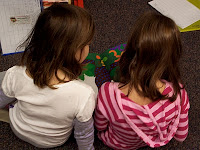The Significance of Talk
You won't walk into my classroom and find absolute quiet. I believe students learn through collaboration and conversation so I create opportunities for talk. Students have partners to "turn and talk" during focus lessons and read alouds, students talk to other student authors during writer's workshop, they are able to read with friends during reader's workshop, and there are opportunities across our day to have friends assist and challenge thinking.
Of course, talk isn't always easy to manage. Some students prefer a quieter room for working. We have to discuss and reach a shared understanding about what we want our classroom to sound like during learning times. We talk a lot about talk that helps us to learn. What does it sound like? What is it about? Students learn tricks for keeping talk soft. We discuss often the importance of keeping our conversations about learning. Students know what to do if a conversation gets too far off track.
Often as I'm conferring with individuals or working with small groups during Reader's Workshop, I wonder about the conversations taking place around books. I often wish I could just place little microphones around the room so I could reflect on the talk in our classroom and highlight examples of smart talk for our community.
Talk is important for students, but listening is important for teachers.
Lessons from Readers
Last week, I was busily conferring with readers after which I pulled a small group of students to work on inferring. Throughout the group, I kept watching three boys who were congregated around a magazine. They were obviously quite caught up with the magazine, but the volume level of their conversation was ever increasing. I do not like to have to interrupt a conference with a student or a conversation with a group to redirect kids in the classroom, but it was all I could do to wait for that group to end so I could go over to get those boys redirected.
Luckily, I've learned over the years to ask kids about the work they are doing before redirecting them. So I sat down beside the boys and asked, "What are you reading?"
They quickly showed me the front of this magazine that had them so caught up in discussion. One of the students had purchased Predator Showdown, a Scholastic publication, at a recent bookfair.
"What have you been talking about?" I asked.
"Which is more powerful: an alligator or a shark?" they replied. The three did not agree on which was more powerful and they quickly filled me in on the conversation. They took me to several parts of the magazine to prove their thinking. This magazine was full of graphs, charts, pictures, captions, and text with evidence. They flipped from the page to the back of the magazine and then to the front, back and forth. Though they didn't agree, each had good evidence to prove their current thinking. They listened. They talked. They showed. They debated.
So while I had been working with a group to infer, these three boys were busy putting this into practice in an authentic and engaging debate about animal power. Talk is significant.



Brilliant line: "I've learned over the years to ask kids about the work they are doing before redirecting them."
ReplyDeleteIt can be such a challenge to trust the (loud) talk our kids do without us but, isn't it s powerful! Thanks for reminding us to trust the work our kids do!
ReplyDeleteLike Mary Ann, the line about paying attention to what kids are doing before jumping in and redirecting them spoke to me.
ReplyDeleteI need more blog friends like you. Love your workshop fundamentals. I'm RIGHT there with you!
ReplyDeletemrs tabb
anotherdayinfirstgrade.blogspot.com